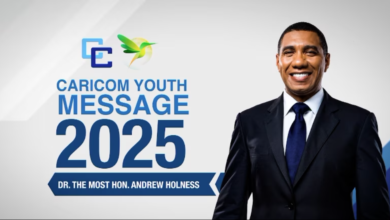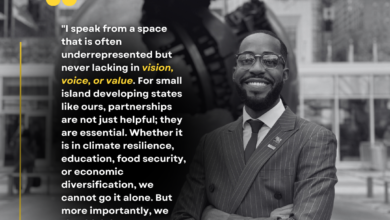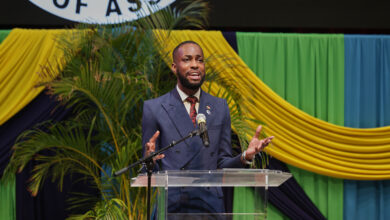New CARICOM Secretary-General Dr Carla Barnett’s first public appearance since her Installation has been with the Region’s Youth.
Dr Barnett presented remarks at the Opening Ceremony of a CARICOM Youth Ambassadors’ Orientation Programme on Thursday 26 August 2021.
See her full remarks below:
- Representatives of International Organisations;
- Members of the Diplomatic Corps;
- Directors of Youth of CARICOM Member States;
- Members of the Executive Management Committee and Staff of the CARICOM Secretariat;
- CARICOM Youth Ambassadors;
- Representatives of Youth Organisations.
It is my pleasure and privilege to be here with you today. I am particularly pleased that this is among my early Community activities, since I assumed duties as Secretary-General not quite two weeks ago. This is my second week.
The participation of our young people in building the Caribbean Community and the focus on youth development go hand in hand and these are high among the priority areas which I have committed to championing during my term of office.
My vision to see the average citizen feeling “a part of and not apart from” our Caribbean Community, cannot be achieved without the active engagement and involvement of you, our youth.
I applaud the work that you all do in your respective organisations, to reflect and represent the voices of youth, to advocate on issues of concern, and to inform and educate young people in a variety of ways. A tremendous thank you particularly to CARICOM Youth Ambassadors, past and present, for the invaluable contribution you have made and continue to make in building this Region.
I also commend the commitment and contribution of the Caribbean Regional Youth Council (CRYC) and your national chapters, as well as UWI STAT’s work on the campuses of the UWI, and Ikemba’s pioneering work among youth to raise awareness of the important matter of reparations for enslavement and native genocide.
A very warm welcome to the youth leaders from these groups who are joining with the Youth Ambassadors for the training in Health and Climate Change, and on the work of the Secretariat and the Community. These training opportunities are intended to build capacity to support and promote regional integration, and to strengthen your abilities as young leaders as you prepare yourselves for greater leadership roles at the national and regional levels.
A little over ten years ago in 2010, the Report on the CARICOM Commission on Youth Development lamented limited youth engagement in CARICOM due to disaffection and apathy. Some youth reported not even having heard of CARICOM. Today, I see efforts by all of you to change that narrative, through your community and national projects in your respective countries.
On CARICOM Day earlier this year, the “I AM CARICOM” Campaign resonated across the Community, enabling more young people to embrace their identity as CARICOM citizens and allowing them to reflect on their contribution to national and regional development. Your expressions and passion were felt by many. These actions are commendable, and as we go forward, let us think of more ways to bolster trust, build positive perceptions, inspire Community spirit, and enable others to see and feel the positive impact of our work on their lives.
The Declaration of Paramaribo on the Future of Youth in the Caribbean Community issued by our Heads of Government at a Special Summit on Youth held in Suriname in January 2010, affirmed the invaluable nature of youth who possess the “unique perspective, creativity, energy and other assets” relevant for “societal change, technological innovation and development”. For this reason, the Declaration states that youth are “invaluable assets and partners in development and not problems to be solved”.
Cognizant of the fact that over 60 percent of the population of the Caribbean Community are under 30 years of age, where we fail to involve youth in the sustainable development process in this Region, we do so to our peril. In this time of crisis, brought on by the COVID-19 Pandemic we must also acknowledge and address the negative socio-economic and mental health impact on our youth.
It is said that “Youth development is a process that prepares a young person to meet the challenges of adolescence and adulthood and achieve his or her full potential. It is promoted through activities and experiences that help develop social, ethical, emotional, physical, and cognitive competencies,” according to the Commonwealth’s Global Youth Development Index (2017). This Orientation Programme is a step along that path.
I would like to express appreciation to our partners – to PAHO, the British High Commission in Guyana and the Institute of Law and Economics, Jamaica – who have come together to contribute to building your competencies through this innovative training programme. I can see that a relevant and diverse programme has been put together, to build your understanding and skills in Climate Change and Health, Social Media Promotion, Networking and Diplomacy, among other areas.
I would like to sepecially welcome Mr. Adrianus Vlugman, Technical Expert on Climate Change and Health, and to thank him in advance for the knowledge and expertise that he will share with you, beginning tomorrow. I also anticipate that your knowledge of CARICOM’s functions, Organs and Bodies, will increase as you interact with several members of staff of the Secretariat during the Orientation Programme.
I am aware that former Secretary General LaRocque regularly engaged with youth across the Community, through an annual virtual forum facilitated by the Youth Ambassadors. I am committed to continuing and expanding this engagement to build a strong partnership with youth, and to facilitate dialogue on issues of importance to youth and the Community.
As you go through this programme, I would like you to consider how the Community can serve you better, how we can constantly provide you with more information on our work and how you see yourselves contributing even more to the work of the Community.
I wish you all a very successful Orientation Programme, and I hope that you will emerge from the experience more knowledgeable, more inspired and more connected to each other and even more able to contribute your creativity and energy to our regional endeavor; for this is your Community and you, the youth of the Community, have the most to gain and the most to lose as we work to build our region.
I thank you.






